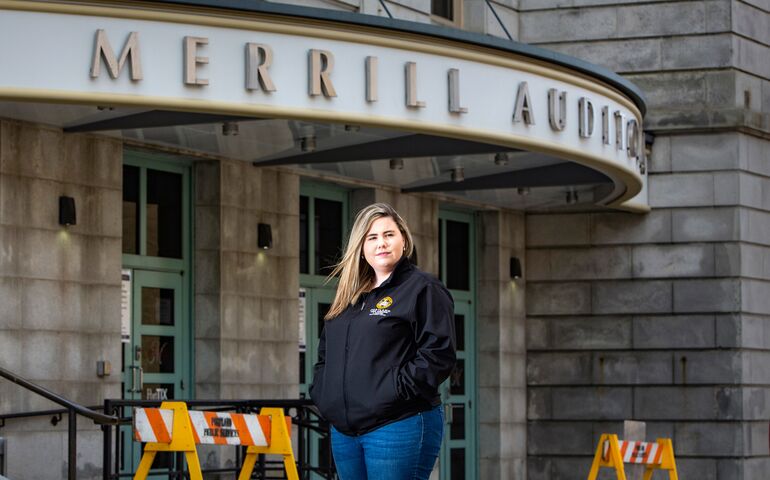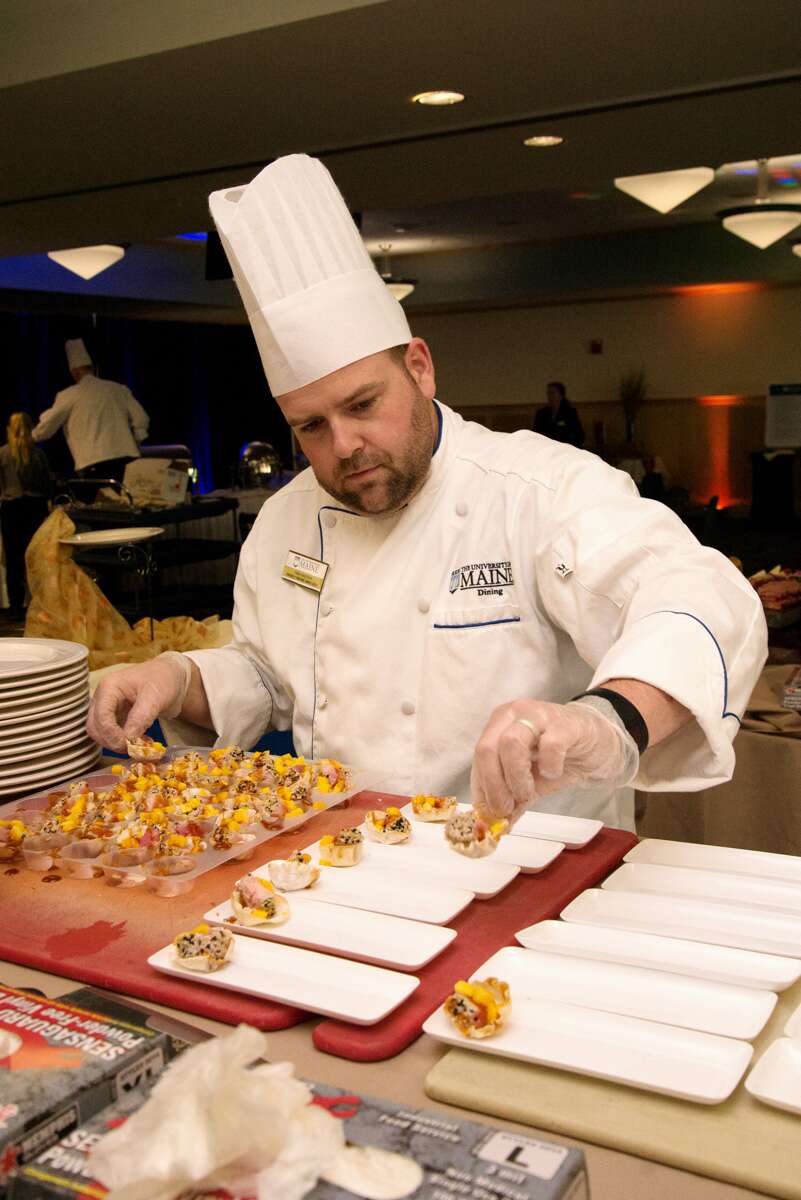
Processing Your Payment
Please do not leave this page until complete. This can take a few moments.
- News
-
Editions
View Digital Editions
Biweekly Issues
- October 20, 2025
- October 6, 2025
- September 22, 2025
- September 8, 2025
- August 25, 2025
- August 11, 2025
- + More
Special Editions
- Lists
- Viewpoints
- Our Events
- Calendar
- Biz Marketplace
Maine's hospitality field is all about people, and some surprising opportunities
 Photo / Tim Greenway
Caitlyn Stearns, age 24, is food and beverage coordinator for four of the city of Portland’s events venues, a job she got directly out of college.
Photo / Tim Greenway
Caitlyn Stearns, age 24, is food and beverage coordinator for four of the city of Portland’s events venues, a job she got directly out of college.
In 2016, Caitlyn Stearns enrolled in the general studies program at Southern Maine Community College in South Portland.
The program required her to take an elective, so she took an introductory course in the school’s hospitality management program.
“I absolutely fell in love with it and decided that’s what I wanted to do,” she says.
Today, at age 24, she’s a food and beverage coordinator for four of the city of Portland’s events venues.
“It’s really cool,” she says. “My day can go from the elegance of Merrill Auditorium and clients like Bill Murray and Jay Leno, to the Portland Expo buzzing with fans, to the stadium with high school sports and championships. It’s quite a fun job.”
Fast-growing industry
Stearns is one of a growing number of people looking for careers in Maine’s hospitality and culinary industries. They can get training through dedicated programs at institutions throughout Maine. Southern Maine Community College’s two-year Culinary Arts and Hospitality Management programs, for example, each offers an associate degree that provides students with a foundation in theory and practices of the industries as well as a core of liberal arts and science courses designed to prepare students for flexible career development.
SMCC owns its own events venue, offering further training.
“We do a lot of hands-on application of what we’re learning in the classroom,” says Maureen LaSalle, chair of both of SMCC’s Culinary Arts and Hospitality Management programs. “In the event management class, students plan and execute live events. If you don’t have the chance to experience what you’re learning, how do you make sure it’s the right fit for you? We expose them to as much of the industry as we can.”
The hospitality and culinary fields are not just about restaurants and hotels, she explains. The business and “people” skills taught in the program are applicable across industries. Paid internships have taken place at companies like American Airlines and Disney World.
100% placement
SMCC enrolls 45 students in its hospitality program and 90 in culinary arts. About 85% are from Maine. The split between high school graduates and older, non-traditional students is 50/50.
“The industry is bursting,” LaSalle says. “These students are in demand.”
Some students start their own businesses; others work for hotels, restaurants and events centers. One student was recently promoted to a front office position at a hotel.
“And it’s not just hospitality and tourism,” LaSalle says. “You’ll see the medical industry hiring hospitality students because people skills are so valuable. This is applicable across industries.”
Because of that diversity, there’s no typical salary and benefit package after graduation. But she cites one graduate who enrolled in a corporate management program with a starting salary of $40,000 and full benefits.
“There’s potential,” she says.
I find it really fulfilling. I love the special details.
— Lydia Lane
Events start-up
While still in SMCC’s hospitality and business programs, Lydia Lane started a wedding and event planning business called fern & flair, and designed and worked at weddings, fashion shows and corporate fundraisers. By the time she graduated in 2017, her career was well underway.

Today, at age 22, she runs the business out of her home in Gorham, with two part-time employees and her husband also helping out. In 2019, she staged 22 weddings in Maine, as well as Florida and New York.
“I find it really fulfilling,” she says. “I love the special details and making the day flow smoothly.”
There can be drawbacks. She doesn’t earn enough yet to afford her own benefits, so she’s enrolled in her husband’s health plan. Owning a business is also hard work.
“Anytime you start a business, you’re still hustling in other jobs,” she says. “You have to work hard to become sustainable.”

The right personality is a must, she says.
“Owning a business, you have to be very organized,” she says. “You don’t have anyone to tell you what to do. If you’re self-driven, it can be a great path.”
Chefs and educators
The culinary industry is seeing similar growth and diversity, says Jay Demers, chair of Eastern Maine community college’s two-year culinary arts program.
In his 20 years there, program enrollment grew from a dozen students to nearly 100 a decade ago. Today, enrollment is about 50.
“Our numbers ebb and flow with the economy, generally running countercyclical to it,” Demers says. “When the economy is strong, we tend to have fewer students. When the economy pulls back our enrollment tends to swell as people seek to better their skills to attain better positions.”
Course work includes menu development, regional cookery, lab work and operating the school’s in-house restaurant. Students learn specialized skills like butchery and cheese making. During the summer, first-year students complete externships.
“The intent is for the students to work in a true restaurant/institutional environment to understand the pressure, pace and expectations of the industry,” Demers explains.
Many graduates start in restaurants, but advance to other food-related occupations.
“We have graduates who are culinary educators and work at hospitals as chefs and dieticians,” he says. “Generally, they go on to successful careers. In the last decade, we had 11 students become entrepreneurs, mostly in restaurants and catering.”
Salary and benefits vary, depending on job and geography.
If you decide this is going to be your life’s work, there’s money to be made.
— Jay Demers
“There are huge pay differences,” he says. “In more rural areas, wages tend to be lower. In busier areas, the money gets better. There’s a lot of opportunity for overtime. Institutions, compared with independent restaurants, tend to offer better overall packages, including benefits. If you decide this is going to be your life’s work, there’s money to be made.”
Stable work
Todd Chasteen, executive sous chef at the University of Maine, is a 2006 graduate of EMMC’s culinary program and was trained by Demers.

“One exercise Jay wanted us to do was make a multi-year plan,” he says. “By five years, I wanted to be a sous chef. But before I even graduated, I was a sous chef. Things were fast-tracked.”
Chasteen, who is 38, cooked at several Bangor area institutions and restaurants. He landed at UMaine six years ago.
“It was something I was good at, and something I could do without sitting in an office with wall-to-wall cubicles, pushing paper,” he says.
Overall, says Demers, there’s plenty of opportunity in Maine.
“The biggest shift in the last decade is that students understand they have the ability to venture out on their own and do what they love,” he says. “There are other careers with better returns. But if they love this, they never feel like they’re working.”
Mainebiz web partners
Related Content

The Giving Guide
The Giving Guide helps nonprofits have the opportunity to showcase and differentiate their organizations so that businesses better understand how they can contribute to a nonprofit’s mission and work.
Learn More
Work for ME
Work for ME is a workforce development tool to help Maine’s employers target Maine’s emerging workforce. Work for ME highlights each industry, its impact on Maine’s economy, the jobs available to entry-level workers, the training and education needed to get a career started.
Learn More
Groundbreaking Maine
Whether you’re a developer, financer, architect, or industry enthusiast, Groundbreaking Maine is crafted to be your go-to source for valuable insights in Maine’s real estate and construction community.
Learn more-
The Giving Guide
The Giving Guide helps nonprofits have the opportunity to showcase and differentiate their organizations so that businesses better understand how they can contribute to a nonprofit’s mission and work.
-
Work for ME
Work for ME is a workforce development tool to help Maine’s employers target Maine’s emerging workforce. Work for ME highlights each industry, its impact on Maine’s economy, the jobs available to entry-level workers, the training and education needed to get a career started.
-
Groundbreaking Maine
Whether you’re a developer, financer, architect, or industry enthusiast, Groundbreaking Maine is crafted to be your go-to source for valuable insights in Maine’s real estate and construction community.
ABOUT
NEW ENGLAND BUSINESS MEDIA SITES
No articles left
Get access now
In order to use this feature, we need some information from you. You can also login or register for a free account.
By clicking submit you are agreeing to our cookie usage and Privacy Policy
Already have an account? Login
Already have an account? Login
Want to create an account? Register
Get access now
In order to use this feature, we need some information from you. You can also login or register for a free account.
By clicking submit you are agreeing to our cookie usage and Privacy Policy
Already have an account? Login
Already have an account? Login
Want to create an account? Register











0 Comments